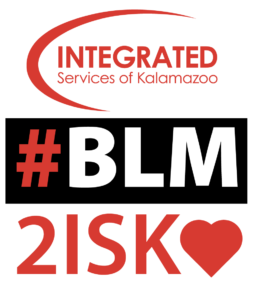“Integrated Services of Kalamazoo pledges to continue to identify and address inequalities within our programs, system of care and procedures, and we support individuals and organizations who are willing to speak out for the goal of equal treatment for all.”

Jeff Patton, Chief Executive Officer of ISK, announced in January 2021 that ISK’s board of directors has passed a resolution declaring racism a public health crisis.
“This resolution marks a new era for ISK and supports the input from staff during our conversations last year, and the workplan that is being developed and finalized by our Trauma Informed Resiliency Oriented Equity Committee,” Patton said. Last summer, Patton held a series of online listening sessions with ISK staff regarding the Black Lives Matter movement and addressing racism as a public health crisis.
The board resolution states that ISK is “committed to ending racism, racial disparities, and discrimination in Kalamazoo County’s public community mental health system, and throughout our society.”
Along with the resolution, this week Patton also released ISK’s Black Lives Matter Position Statement, a report on Race and the ISK Service Population, and a list of historic United States Supreme Court rulings on race.
ISK joins the Kalamazoo County Board of Commissioners in declaring racism a public health crisis, which the county did in June 2020. The resolution notes that ISK also joins the American Public Health Association, the American Medical Association, the American Academy of Pediatrics, and the American College of Emergency Physicians in declaring institutional racism an urgent public health issue that must be eradicated, and supports Governor Gretchen Whitmer’s Executive Directive No. 2020-09, identifying racism as a public health crisis.
The conclusion of ISK’s Black Lives Matter Position Statement reads, “The United States of America as a nation, and Americans individually, clearly have much work to do to build a country free from inequality. And there is much to do in that regard within our public mental health system. Stating that Black lives matter, whether anyone agrees with the actions of the Black Lives Matter organization, is merely an acknowledgement that all lives in America do not matter unless we address the unequal treatment and unequal opportunities faced by Black Americans. Integrated Services of Kalamazoo pledges to continue to identify and address inequalities within our programs, system of care and procedures, and we support individuals and organizations who are willing to speak out for the goal of equal treatment for all.”
The report Race and the ISK Service Population was prepared in December 2020 by Amy Galick, ISK Senior Data Analyst, as a way to consolidate ISK’s past findings about race and illuminate how race affects the system as a whole. It includes breakdowns of the ISK service population by race in terms of poverty, criminal justice system involvement, mental health diagnosis, homelessness, etc., and details racial disparities within the population that put ISK’s non-white consumers at even higher risk. One notable way that racism affects health is through social determinants of health, the report states. “Social factors such as where people live and work, what food and transportation they can access, or in what ways they interact with their community, have been shown in extensive research to have measurable impacts on various health outcomes. Racism creates disparities in these social factors, which then carries forward into similar disparities in the affected health outcomes.”
Patton and ISK’s Trauma Informed Resiliency Oriented Equity Committee are developing a work plan to address racism as a public health crisis across the organization.







